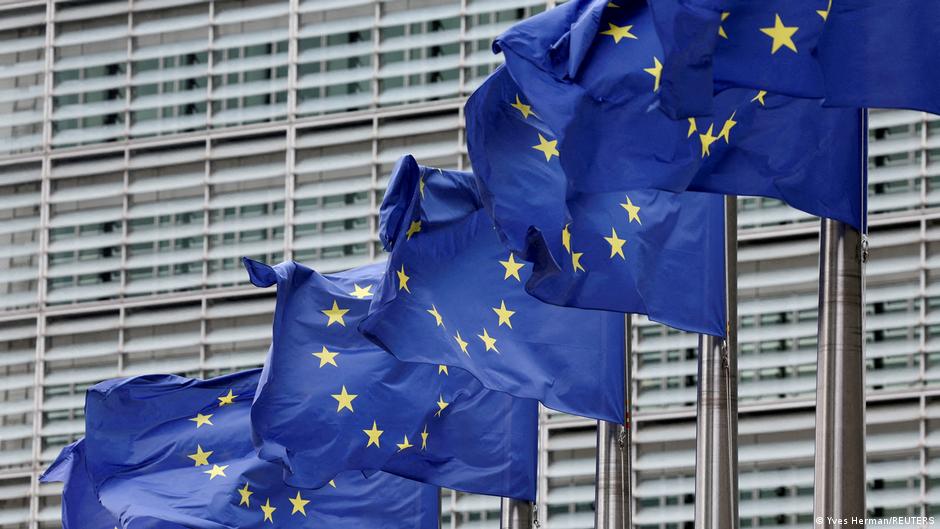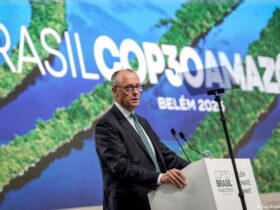The EU wants to tackle foreign interference and stem the flow of online disinformation – but experts say the list of largely voluntary measures unveiled on Wednesday is only a small step towards the goal.
The European Commission’s new policy plans, dubbed the “democracy shield”, include setting up a new EU Center for “Democratic Resilience” and funding for independent fact-checkers in all languages spoken across the bloc.
“Disinformation, algorithmic manipulation, financial pressure on the media and AI tools now threaten our democratic way of life,” European Commissioner Michael McGrath told reporters on Wednesday.
“Authoritarian regimes are using mixed tactics, attacking infrastructure, exploiting migration, manipulating information, deploying criminal networks and interfering in our electoral processes.”
Standing at his side, EU digital chief Hanna Virkkunen was less vague in her accusation, explicitly accusing Russia of targeting the bloc with “information manipulation and interference.”
What is the EU’s ‘democracy shield’?
The European Commission’s so-called democracy shield largely depends on strengthening existing measures or improving coordination.
EU officials want to work with tech companies on a new “incidents and crises” protocol to ensure EU governments can take action more quickly if they see a large-scale disinformation campaign.
The Commission also vowed to “strengthen” funding for local and independent media and “assess” new ways to “modernize advertising rules to promote the sustainability of EU media”.
But top billing was given to the bloc’s new counter-disinformation centre, which an EU official said would likely become operational next week. McGrath said the new center should help EU states work together to “avoid threats” and “fine-tune” responses.
Future members are also welcome
Interested EU members such as Ukraine, Montenegro or Albania will also be invited to join the club.
“The reality is that as they get closer to EU membership, the intensity of the threat they face in terms of foreign interference is increasing,” McGrath said.
EU candidate and former Soviet state Moldova Critical elections this year faced massive interference efforts, This also includes schemes uncovered by journalists in which citizens were offered cash payments from Russia-based banks for posting anti-government material online. Moscow denied any involvement in the interference.
Does the plan have any merit?
But this major new hub is also only a voluntary measure, meaning national EU governments will not be obliged to participate.
Policy analyst Lewis Quarits says that’s because the bloc’s executives are being careful to avoid treading on the toes of capitals.
“Member states do not want the European Commission to be too active in an area they consider a matter of national competence and sovereignty,” Kwaritsa, a researcher at the Jacques Delors Center think tank, told DW.
He said Brussels’ new plans are full of “good ideas”, but he warned The EU’s current approach to fighting disinformation – which includes exposing and debunking individual examples of false narratives spread by online bots or “doppleganger” webpages designed to trick users into thinking they are reading articles on national news websites – may be missing the target.
He explained, “By the time people have seen them, or by the time fact checking has been added, it’s too late. People have seen it and it doesn’t really make a difference.”
Wary of Washington?
The EU’s executive was insistent that its democracy shield would not quash free speech or expression. This message seems to have been carefully crafted not only for EU citizens, but also for parliamentarians across the Atlantic.
The Trump administration has pushed back against the EU’s digital rulebook, with Vice President J.D. Vance using a speech in Paris earlier this year to criticize the bloc and warning that “the United States cannot and will not accept the clampdown on American tech companies” by foreign governments.
Wednesday’s measures did not place any new legal obligations on big tech, instead asking platforms like Facebook, TikTok and Google – which have voluntarily signed the EU anti-disinformation code of conduct – to work more actively with governments.
X marks place?
This once again put X, formerly Twitter, in the spotlight, withdrawing from all voluntary EU measures in 2023 under the leadership of Elon Musk.
On Wednesday, the European Commission again denied accusations that it delayed the outcome of a two-year-old investigation into suspected EU law violations in Iraq to keep the Trump administration happy amid uncertainty over US tariffs and support for Ukraine.
“The commission is enforcing these rules every day,” Virkkunen told reporters. “We are also looking forward to concluding some of the investigations in the coming weeks and months. So this is a work in progress all the time.”
Reporters Without Borders was one of the organizations calling on the EU to tighten technical measures in its democracy shield scheme.
“It is time to take back control of the online space, ensuring that the algorithms of social media platforms and AI assistants are designed to uphold democratic guarantees by promoting trustworthy news sources,” Director General Thibaut Brutin said on Wednesday.






Leave a Reply